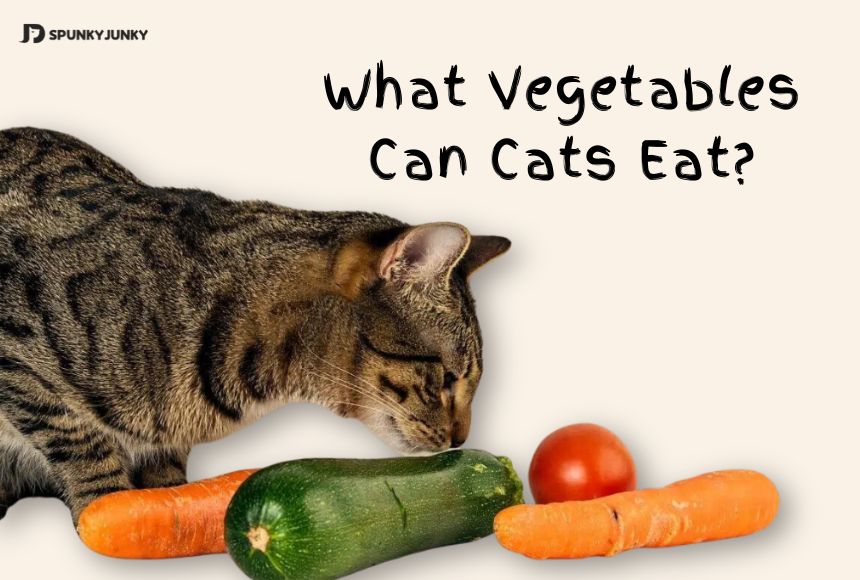Curious about whether your feline friend can munch on some veggies?
Well, the answer might surprise you! While cats are known as obligate carnivores, meaning the meat is their primary source of nutrition, there are some vegetables they can safely enjoy in moderation.
In this green exploration, we'll delve into the world of feline-friendly vegetables and those best left off their plates. Let’s start!
Can Cats Eat Vegetables?
Can cats eat vegetables? Yes!
It's safe to incorporate some vegetables into your cat's diet, such as cooked carrots or broccoli. However, you should steer clear of giving your cat vegetables like onions or garlic, as these can be toxic and lead to severe health issues.
However, cats should never rely solely on vegetables for their nutrition, the majority of their dietary needs should be met with a meat-based diet.
Cats are obligate carnivores, which means the protein they obtain from meat is the only kind that adequately satisfies their nutritional requirements. Therefore, a diet primarily based on meat is the optimal choice to maintain your cat's well-being.
11 Safe Vegetables for Cats
1. Broccoli improves cat digestion

You can give your cat some cooked and cooled broccoli to promote healthy digestion and soothe an upset stomach. Gentle steaming is the best way to preserve its nutrients and make it easier for your cat to eat.
However, remember to offer broccoli as an occasional treat, as too much of it may result in diarrhea.
2. Carrots provide vitamins to cats
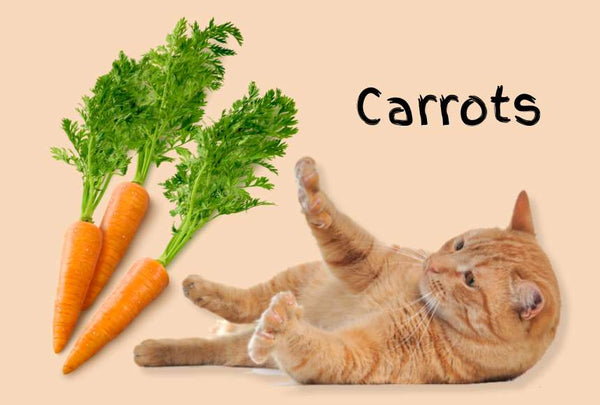
Carrots are a nutritious option for your cat as they are rich in essential vitamins and minerals, especially vitamin A. This vitamin is vital for your cat's overall health. However, it's important to offer carrots as a snack in moderation.
You can give your cat carrots either cooked or raw, but it's best to cook them first to prevent any choking hazards.
3. Green beans safe for cats
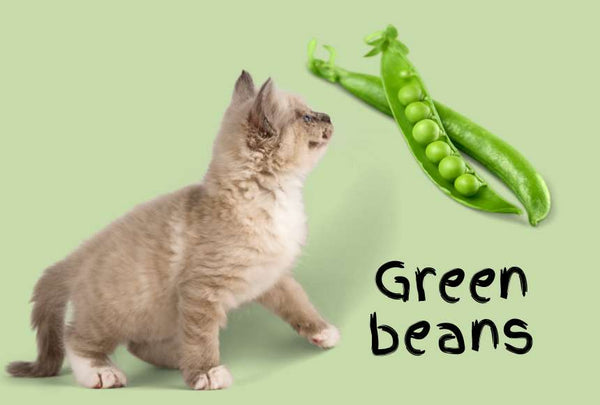
Many other green vegetables are safe and beneficial for your cat's diet, including peas and green beans.
When cooked, fresh or frozen green beans provide numerous health benefits. If you opt for canned green beans, ensure they have low sodium content, as excessive sodium can be harmful to your cat.
Green beans stand out as they offer fiber, which aids in your cat's digestive health and weight management. Similar to carrots, green beans contain a moderate amount of oxalates, so it's wise to limit their consumption in cats with a history of bladder issues.
4. Pumpkin prevents cat stomach sensitivity
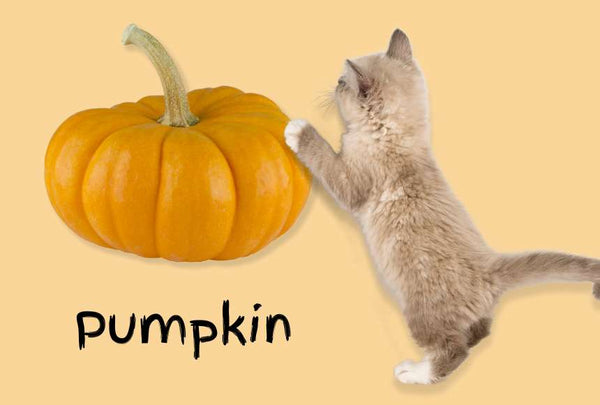
Small amounts of cooked pumpkin can be beneficial for your cat, especially if they struggle with constipation or have a sensitive stomach. Some veterinarians even recommend incorporating pumpkin into a cat's diet to aid with digestion.
If you decide to give your cat some pumpkin, be sure to cook it first. Additionally, remove the seeds, as they can pose a choking hazard. You can either chop the pumpkin into small pieces or prepare a pumpkin puree to occasionally mix into your cat's food if they enjoy it.
5. Cucumbers provide moisture to cats
Some veterinarians suggest that cucumber can be a good way to provide extra hydration for your kitties. Cucumbers are one of the rare vegetables that can be served raw, but it's essential to peel them and give them a thorough wash.
If your cat enjoys cucumber, offer it in small amounts and only occasionally. Consuming too much cucumber can lead to diarrhea.
6. Asparagus helps relieve cat gastrointestinal issues
Cats can eat asparagus, which might even deter them from nibbling on houseplants. According to some veterinarians, asparagus could help alleviate upset stomach and related issues like diarrhea or constipation, thanks to its high fiber content. However, excessive consumption can lead to gastrointestinal and urinary problems. When feeding asparagus to your furry companion, ensure it's properly cooked, as it can pose a choking risk when raw.
7. Potatoes safe for cats
Although potatoes are not toxic to cats, they don't benefit their diet significantly. There's no need to include potatoes in your cat's meals. If you decide to give your cat potatoes, ensure they are thoroughly cooked and free of seasonings. Remember that potatoes are high in carbohydrates, so they should only be an occasional treat, not a regular part of your cat's diet.
8. Corn safe for cats
Some cat food manufacturers use corn as a filler. While it's safe, cats don't derive much nutritional value from it.
9. Lettuce provides dietary fiber to cats
Lettuce is primarily composed of dietary fiber. According to some cat nutrition specialists, a small amount of lettuce might aid in your cat's digestion or alleviate constipation.
However, be cautious not to overdo it, as excessive lettuce consumption can result in diarrhea. One small serving per week is typically sufficient. To prevent choking, cut the lettuce into small pieces.
3 Vegetables To Avoid
1. Onions can damage your cat’s red blood cells
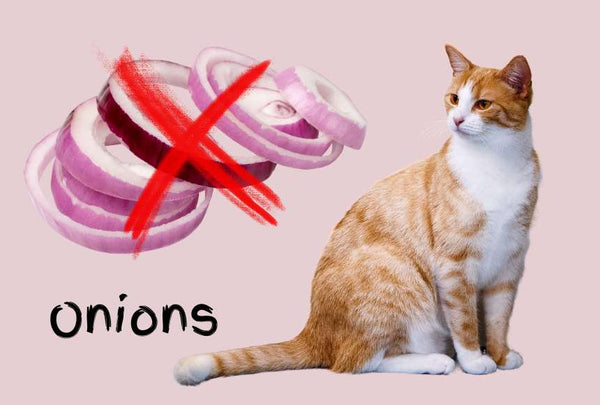
Certain vegetables from the Allium genus, such as onions, chives, garlic, and leeks, are harmful to cats because they contain sulfur-containing compounds that cats have difficulty processing. These compounds can harm red blood cells, leading to their destruction by the cat's body, which can result in anemia.
These vegetables are toxic in all forms, whether raw, cooked, or powdered.
The level of toxicity can vary depending on the concentration of these harmful compounds, with garlic being the most potent among them.
2. Some cats are allergic to tomatoes

While ripe tomatoes are not highly toxic to cats, they do contain a substance called solanine. It can be harmful to cats if consumed in large amounts.
Eating small amounts of ripe tomato flesh is unlikely to cause major harm to most cats, but it is not a natural part of their diet and some cats may be sensitive to it, causing digestive distress such as vomiting or diarrhea.
3. Avocados are toxic to cats
Avocados contain a substance called persin, which is toxic to cats and many other animals, including dogs and birds. Persin is found in all parts of the avocado, including the fruit, pit, leaves, and bark.
Eating even small amounts of avocado can cause digestive upset in cats, including symptoms such as vomiting and diarrhea. In more severe cases, it can lead to more serious health problems, such as difficulty breathing and fluid buildup around the heart.
To ensure your cat's safety, it's best to keep avocados and avocado-containing foods out of your cat's reach and not include avocados in your cat's diet.
Conclusion
Well, it’s time to lighten up your kitty’s plate with some veggies! But remember, vegetables are the backing singer, not the lead singer, in your cat’s diet. Of course, carrots or mung beans are great options for kittens. But don’t put those onions and garlic on the list. Our goal is to provide cats with healthy and delicious food.
If you have a dog with you, check out WHAT CAN'T DOGS EAT? because we've learned which vegetables are good for dogs too!




